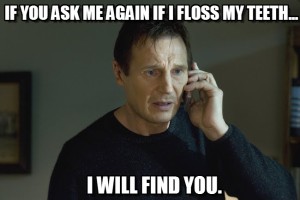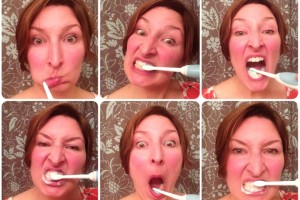5 unexpected dental tips? You may be surprised at what you’re about to read, but at 1st Family Dental, we would like to challenge some common myths and concerns some folks have about what’s really most important when it comes to oral health.
Here’s our 5 unexpected dental tips from your dentist.
1. A healthy smile is more important than a “perfect” smile.
Repeat afte r us: healthy is beautiful. Who better to define what beauty means to you, than YOU? Our smiles are what make us unique. If everyone had the same uniform, cookie-cutter set of teeth, life would be boring. To us, the most important thing about your smile is that it’s healthy enough to last a lifetime, and that YOU feel great about it.
r us: healthy is beautiful. Who better to define what beauty means to you, than YOU? Our smiles are what make us unique. If everyone had the same uniform, cookie-cutter set of teeth, life would be boring. To us, the most important thing about your smile is that it’s healthy enough to last a lifetime, and that YOU feel great about it.
That’s why at a first visit you’ll often hear us ask: what do you love about your smile, and is there anything you’d like to change about it? Our job is not to tell you what to do, or how you should look, but to help you understand what’s going on when it comes to your oral health, and provide you with information and options so you can decide what works best for you.
2. The most important dental work you’ll ever have done is what you do at home.
We mean this in the nicest way, but truly, we’d prefer to only need to see you every 6 months for a checkup and cleaning. Of course we know that cavities and other treatment is necessary sometimes, but believe us when we tell you it feels just as nice to say “looks great, see you in 6 months,” as it is to hear it.
The best possible dental tip we can give you to keep your smile healthy and bright is to keep up a great dental hygiene routine at home that includes brushing twice a day for 2 minutes, and flossing at least once a day.
Dental decay is one of the most common and preventable diseases in the world. While there are other contributing factors that can lead to decay and cavities such as genetics, medications, and certain medical conditions, the most common risk factor for developing cavities is still a lack of proper oral care at home.
Think about your regular dental checkup visits and your daily brushing and flossing routine as daily deposits into your “smile retirement fund.” Remember to invest wisely!
3. It’s more important to have properly aligned teeth than “perfectly straight” teeth.
Yes, we just said that. The third of our 5 unexpected dental tips is that while braces and other orthodontic treatment often result in nice, straight, evenly spaced teeth, the most important result is that your bite is properly aligned. Some signs that may indicate a need for orthodontic treatment include difficulty chewing or biting of the lips or cheek, crowding or extra spacing between teeth, clenching or grinding, headaches, or protruding teeth. Sometimes shifting teeth can also be a sign of periodontal or gum disease,

Actress Uzo Aduba attends PaleyFest: Made In NY – “Orange Is The New Black” panel discussion at The Paley Center for Media on Wednesday, Oct. 2, 2013 in New York. (Photo by Evan Agostini/Invision/AP)
(We) Don’t mind the gap
In some cultures, a gap between the front teeth (called an upper midline diastema) is considered a very attractive trait, and can be passed down through the generations. If you’ve never seen the documentary Gap Toothed Women, we recommend checking it out.
There may be a lot of jokes out there about the upper midline diastema, but you won’t hear us making any. For some folks, their gap is part of what makes them who they are. Just ask celebrities like Michael Strahan, Madonna, or Uzo Aduba – all of whom are confident with their smiles.
Some of our patients have needed braces to correct other alignment issues, but did not want to give up their signature gap. Talk about the best of both worlds:
According to one of our Board-Certified orthodontists, Dr. Tamara Oweis, as long as the upper midline diastema is not caused by gum disease or any other pathology, it is possible to correct the alignment in the rest of the mouth, and leave your signature gap.
4. We poke at your gums because we care about you. Really.

You know something happens to a lot of people when you can instantly find hundreds of memes, jokes, and cartoons about it. (We’ll just leave this here for you).
Yes, your dentist or hygienist may poke around your gum line during your checkup. Yes, sometimes folks may experience tenderness or some bleeding. Yes, we may ask you about your flossing habits, or anything going on in your medical history. No, it’s not because we had a bad day – it’s because we’re trying to do right by you.
Gum disease affects nearly half of adults over the age of 30 in the United States. You can learn about some of the causes and treatments for gum disease in our recent blog article, and even follow one of our patients as she blogged about her experience with gum disease.
Your gums are the foundation for your teeth. Here is a short list of some other dental procedures that absolutely require healthy gums:
- Braces, Invisalign and Orthodontic treatment
- Dental Implants
- Teeth Whitening
- Bridges and Partials
- Veneers
Risk factors for gum disease include genetics, age, certain medical conditions, medications, and a history of smoking, but the most common risk factor is that in general, many folks just don’t floss often enough. That may not be what you want to hear, but it’s the truth. Need inspiration? Check out our video on how to floss in 60 seconds (or less).
5. Friends don’t let friends over-whiten their teeth.
White, bright teeth can be a pretty wonderful thing. In-office and at-home teeth whitening are common ways for people to transform and feel more confident about their smile. However, it is possible to have too much of a good thing. The agents used during office procedures, as well as for at-home whitening can actually do more harm than good if they are used too frequently.
The final tip of our 5 unexpected dental tips is that over-bleaching can result in extreme sensitivity, gum irritation, and soft-tissue chemical burns. Over-bleaching can also wear away the protective enamel, making teeth more susceptible to decay.
Even in-office tooth whitening won’t last forever, so touch up treatments and repeat sessions are fairly common. Our in-office whitening treatment also comes with an exam to make sure your teeth and gums are healthy enough to proceed. You can also discuss ways to keep your teeth as white and bright as possible, without over-doing things.




52 Comments
Leave your reply.